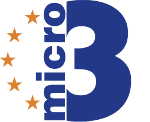- Home
- About
- OSD
- MyOSD
- Partners
- Work Packages
- WP 1Management & Coordination
- WP 2 (OSD)Ocean Sampling Day
- WP 3Oceanography & Environmental Data
- WP 4Standards and Interoperability
- WP 5Bioinformatics & Data Integration
- WP 6Exploring Ecosystems Biology
- WP 7Function and Biotechnology
- WP 8Intellectual Property (IP) Management for Marine Bioprospecting
- WP 9Dissemination & Outreach
- Public DeliverablesAll Micro B3's public deliverables
- Meetings
- Workshops
- Third Micro B3 Industry Expert Workshop
- Micro B3 Industry Expert Workshop
- Micro B3/OSD Analysis Workshop
- Micro B3 Stakeholder Workshop
- Micro B3 Summer School in Crete 2014
- Marine Metagenomics Bioinformatics
- Micro B3 Industry expert workshop
- EU-US Training 2013
- Micro B3 Statistics Training 2013
- MG4U Bioinformatics Training 2013
- Bioinformatics Training 2012
- EU-US Training 2012
Micro B3 Final Conference: Ocean Sampling Day in the spotlight of the International Microbiome Initiative
Micro B3 Final Conference, Royal Flemish Academy of Belgium for Science and the Arts in Brussels from 2nd to 5th November 2015

Furthermore, the Micro B3/OSD aligns nicely with the ongoing discussions on creating the Unified Microbiome Initiative (UMI) or an International Microbiome Initiative (IMI), with both proposals just published in the journals Science and Nature (October 29/30 2015).
Especially Micro B3’s two world-wide Ocean Sampling Days (OSD) and its citizen science campaign MyOSD can be considered a proof of concept for the main issues denoted1, like standardisation for comparative data analysis and data sharing, internationality, interdisciplinary, training, as well as a solid legal framework with respect to the recently ratified Nagoya Protocol to the Convention on Biological Diversity.
This Protocol is an important cornerstone to provide a solid legal framework on Access to and Benefit Sharing (ABS) of marine genetic resources as outlined and emphasized by an illustrative talk by Chris Lyal from the Natural History Museum, London.
Building on all the enthusiasm generated through the OSD and MyOSD campaigns, Frank Oliver Glöckner emphasizes: ‘Micro B3 with its OSD 2014 and 2015 sampling campaigns has just marked the beginning of a global endeavour to better understand the role microorganisms play in providing essential ecological, social and economic services.’
As invited speaker and Advisory Board Member Linda Amaral Zettler (Woods Hole, USA) highlighted promising US-American initiatives dealing with the high diversity of marine microorganisms - some finished, and some running in parallel - but all fuelling world-wide microbiome data comparisons for better understanding biodiversity and functions. This was complemented by a fascinating talk of Colomban de Vargas (CNRS, Roscoff) on results of the TARA Oceans circumnavigations which brought to our attention the incredible biodiversity within the marine micro-, phyto- and zooplankton.
Tom Redd from the European Joint Programming Initiative JPI Oceans presented their wide-ranging pilot actions, into which future OSDs might fit well. Simon Claus and Angel Borja outlined how Micro B3 integrates well with the ongoing DEVOTES project and the recently started infrastructure project AtlantOS.
Kicked off by Torger Børresen from the ERA-NET Marine Biotech the conference continued with presenting many biotechnological results relevant for blue growth. Two patents are planned to result from Micro B3-funded research, many new methods and software tools were tested, expanded and are now widely available. Some stem from extreme environments – and as such are of high interest to enzyme-developers in environmental, cosmetics, pharmaceutical food and feed markets. The embedded third industrial expert workshop of Micro B3 with invited speakers from several successful SME’s and industry paved the way how to collaborate to better exploit diverse value chains with marine inputs.
Presentations and pictures from the event are available at: https://owncloud.mpi-bremen.de/index.php/s/c2ukvCqCgqL9kiG
Contact:
Prof. Frank Oliver Glöckner
Jacobs University Bremen gGmbH
Tel: +494212003167
e-mail: f.gloeckner@jacobs-university.de
---
1 Guidelines, Priorities, Tools and Forums for the IMI, see DOI: 10.1038/526631a








